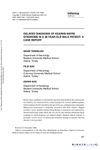 May 2024 in “BMC veterinary research”
May 2024 in “BMC veterinary research” Metabolites and diet affect hair growth cycles in cashmere goats.
 2 citations,
January 2008 in “International Journal of Neuroscience”
2 citations,
January 2008 in “International Journal of Neuroscience” A 38-year-old man was diagnosed late with Kearns-Sayre syndrome after being wrongly treated for epilepsy.
 1 citations,
March 1992 in “Postgraduate Medicine”
1 citations,
March 1992 in “Postgraduate Medicine” About 40% of women by age 60 experience significant hair loss, often due to androgenetic alopecia, with treatments like minoxidil available and hope for future cures.
27 citations,
January 2015 in “International Journal of Trichology” The supplement helps improve hair growth and reduce hair shedding.
 658 citations,
June 2003 in “Endocrine reviews”
658 citations,
June 2003 in “Endocrine reviews” Male hormones may play a role in the development of heart disease, and more research is needed to understand their effects.
 174 citations,
November 2002 in “Expert Reviews in Molecular Medicine”
174 citations,
November 2002 in “Expert Reviews in Molecular Medicine” Hair loss needs more research for better treatments.
 42 citations,
March 2008 in “Molecular and Cellular Endocrinology”
42 citations,
March 2008 in “Molecular and Cellular Endocrinology” Hormones and neuroendocrine factors control hair growth and color, and more research could lead to new hair treatment options.
 2 citations,
April 2017 in “Actas Dermo-Sifiliográficas”
2 citations,
April 2017 in “Actas Dermo-Sifiliográficas” Best treatment for Frontal Fibrosing Alopecia is 5-alpha-reductase inhibitors and intralesional corticosteroids.
 9 citations,
July 2011 in “Scientific Reports”
9 citations,
July 2011 in “Scientific Reports” Changes in the HR gene have influenced hair growth and may lead to hair loss conditions in humans.
 3 citations,
September 2000 in “Geriatric nursing”
3 citations,
September 2000 in “Geriatric nursing” Aging men face unique health issues like erectile dysfunction, prostate problems, and baldness.
 2 citations,
September 2007 in “International Journal of Impotence Research”
2 citations,
September 2007 in “International Journal of Impotence Research” Local testosterone treatment improved sexual desire in a female with fragile X syndrome.
 3 citations,
May 2018 in “Journal of nutritional health & food science”
3 citations,
May 2018 in “Journal of nutritional health & food science” Nutritional supplements can help manage hair loss and promote hair growth by strengthening hair roots and countering harmful effects of pollution, smoking, and deficiencies in vitamins and minerals.
 12 citations,
May 1995 in “Australasian Journal of Dermatology”
12 citations,
May 1995 in “Australasian Journal of Dermatology” Hair loss in women can be slowed with treatment, but more research needed for better solutions.
 19 citations,
January 2019 in “International Journal of Trichology”
19 citations,
January 2019 in “International Journal of Trichology” Indian dermatologists recommend treating common hair loss with a balanced diet, stress reduction, mild shampoos, and sometimes minoxidil and supplements.
 6 citations,
January 2018 in “PubMed”
6 citations,
January 2018 in “PubMed” Heavy metals might contribute to hair loss in Telogen Effluvium.
 January 2017 in “Clinical approaches and procedures in cosmetic dermatology”
January 2017 in “Clinical approaches and procedures in cosmetic dermatology” Retinoids are effective for skin conditions like severe acne and psoriasis but must be used with caution due to potential side effects and risks during pregnancy.
 5 citations,
November 2006 in “Dermatologic Surgery”
5 citations,
November 2006 in “Dermatologic Surgery” Pubic hair transplant surgery is an effective and permanent treatment for pubic hair loss.
 23 citations,
April 2021 in “Journal of Clinical Medicine”
23 citations,
April 2021 in “Journal of Clinical Medicine” Frontal Fibrosing Alopecia's cause is unclear, affects mainly postmenopausal women, and current treatments focus on stopping hair loss rather than regrowth.
 3 citations,
November 2020 in “Clinical, Cosmetic and Investigational Dermatology”
3 citations,
November 2020 in “Clinical, Cosmetic and Investigational Dermatology” Early diagnosis and combination therapy, especially with finasteride and dutasteride, are key to managing Frontal Fibrosing Alopecia effectively.
5 citations,
December 2023 in “Materials” Organic and biogenic nanocarriers can improve drug delivery but face challenges like consistency and safety.
 204 citations,
February 2000 in “Current Medicinal Chemistry”
204 citations,
February 2000 in “Current Medicinal Chemistry” Antiandrogens like flutamide are effective in treating conditions like prostate cancer and hair loss, but there's a need for more potent versions. Understanding their structure can help develop better treatments.
 10 citations,
August 2023 in “Advanced Science”
10 citations,
August 2023 in “Advanced Science” Nitric Oxide has potential in medicine, especially for infections and heart treatments, but its short life and delivery challenges limit its use.
 8 citations,
September 2004 in “Contact dermatitis”
8 citations,
September 2004 in “Contact dermatitis” Avoiding dyed wigs and clothing improved severe allergic reactions in a woman treated with diphencyprone.
 25 citations,
January 2022 in “Endocrine journal”
25 citations,
January 2022 in “Endocrine journal” Long COVID patients may have hormonal imbalances linked to their symptoms.
 4 citations,
January 2015 in “Türk Patoloji Dergisi”
4 citations,
January 2015 in “Türk Patoloji Dergisi” Hormone imbalances from endocrine diseases can cause various skin conditions that help diagnose and treat these diseases early.
 1 citations,
May 2023 in “Journal of neuroendocrinology”
1 citations,
May 2023 in “Journal of neuroendocrinology” DAVID syndrome is a condition with immune system and hormone deficiencies, needing early diagnosis to avoid serious complications.
 2 citations,
November 2013 in “Elsevier eBooks”
2 citations,
November 2013 in “Elsevier eBooks” Hormones control reproduction and are crucial for body balance.
 54 citations,
February 2010 in “British Journal of Dermatology”
54 citations,
February 2010 in “British Journal of Dermatology” Hair loss in women may have causes other than hormones.
 19 citations,
January 2013 in “Pediatrics in review”
19 citations,
January 2013 in “Pediatrics in review” The document says menstruation is important for women's health, discusses menstrual disorders, and suggests personalized treatment options.
2 citations,
January 2014 in “Indian Journal of Critical Care Medicine” Shock can be an early sign of Autoimmune Polyendocrine Syndrome Type II.



























